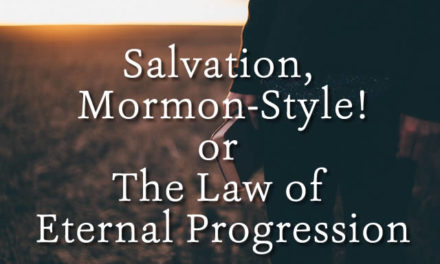October, 2001
Now the Spirit speaketh expressly, that in the latter times some shall depart from the faith, giving heed to seducing spirits, and doctrines of devils; speaking lies in hypocrisy; having their consciences seared with a hot iron; forbidding to marry, and commanding to abstain from meats, which God hath created to be received with thanksgiving of them which believe and know the truth.
Each phrase of this text could warrant a discussion in its own right. For now we shall look only at two phrases: “Some shall depart from the faith” and “giving heed to seducing spirits.”
Mormonism teaches that the true faith totally apostatized necessitating a ‘restoration’ which, they say, came through Joseph Smith. The need for a restoration comes from the mindset of most cults. That mindset holds that true religion is organizationally based. In other words to have the “one true religion” you have to have the “one true church” organization to embody it. That is a fallacy.
Christianity is a relationship of each believer with God. It is direct and personal. One does not enter that relationship by joining an organization, a.k.a. a church. Nor is that relationship with God dependent upon such membership.
To be a member of a Christian church is a healthy thing because it promotes accountability, spiritual growth, and an outward focus through evangelism and missions. It does not result in salvation, or the lack thereof.
To become a Christian is a simple act of faith, or belief with commitment, to the proposition expressed in John 3:16. “For God so loved the world that he gave his only-begotten son, that whosoever believeth in him should not perish but have everlasting life.”
As long as the gospel is written in the pages of scripture and the Holy Spirit brings conviction to the heart of the reader then the cultist cannot say that the church is “totally” apostatized.
The Bible says that “some” shall depart from the faith. Not all.
The next phrase, “giving heed to seducing spirits,” raises an interesting question for the Latter-day Saint. The Mormon’s acceptable evidence of truth is the “burning in the bosom” which they say God sends in answer to their prayer.
How does the Mormon differentiate his burning in the bosom from the evidence sent from a seducing spirit?
Isn’t seduction seductive? Isn’t it something pleasant? Isn’t the burning in the bosom pleasant, even seductive? How does one tell the difference?
Has any Mormon experienced both so that the difference can be explained? What assurance does the Mormon have that his’ testimony’ is from God and not a seducing spirit?
There is a better way to discern truth? Isaiah 8:20 says, “To the law and to the testimony: if they speak not according to this word, it is because there is no light in them.” The “law and the testimony” is the scripture at the time of Isaiah. Today, with the fully revealed scripture, we try the spirits by comparing what they say with what those scriptures say. That makes the test objective rather than subjective.
Evidence from scripture is objective and can be demonstrated. The evidence the Mormon would offer cannot be demonstrated. The only thing they offer is assurance that if you “pray with sincere intent God will manifest the truth of it to you.”
This is tempting God and opening ourselves to Satan’s seduction, because God has already given us the means to discern truth claims.
By David Henke






